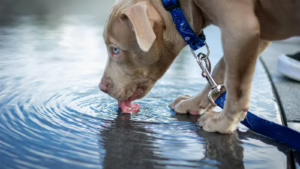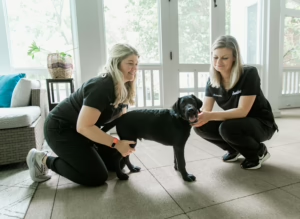As humans, we think fireworks are an exciting way to celebrate the Fourth of July and other occasions. However, unpredictable loud noises and flashing lights are an overwhelming source of fear, anxiety and stress for many pets. In fact, 83% of dogs are afraid of fireworks. Understanding why pets react to fireworks so intensely and knowing how to help them feel safe and calm is crucial to their well-being.
Why Pets May Be Scared of Fireworks and Loud Noises
Pets, particularly dogs and cats, have a heightened sense of hearing compared to humans. Fireworks are loud, unexpected and can result in behaviors such as trembling, hiding, incessant barking, meowing or trying to escape.
Fireworks also trigger a fight-or-flight response to an unseen threat, which puts them at risk of becoming lost or injured. In a survey from the ASPCA, 1 in 5 pets goes missing after being scared by fireworks or other loud noises. Because of this, animal control officials see a 30-60% increase in lost pets each year between July 4th and 6th. July 5th is also known as one of the busiest days of the year for shelters.
In advance, make sure your pets – dogs and cats alike – have identification tags with up-to-date information. If your pets aren’t already microchipped, talk with your veterinarian about how this simple procedure can greatly improve your chances of welcoming a lost pet back home.
How Do You Calm Your Dog or Cat During Fireworks?
Since fireworks aren’t a regular occurrence, here are our veterinarian-approved advice to calm your pet’s anxiety if your cat or dog is afraid during the Fourth of July.
- Create a Safe Space: Designate a safe space your pet can retreat to with closed windows, curtains and doors. This can be a quiet, cozy room or kennel where they feel most comfortable. Equip it with your pet’s favorite blankets, toys and bed to provide a sense of comfort and security.
- Drown The Sound: White noise, a television show or a zen playlist can help drown out scary sounds and distract your pet from sudden loud noises.
- Tire Them Out: Ensure your pet gets plenty of exercise during the day to help them expend energy and relax well before fireworks begin. A tired pet will be less reactive than those with pent-up, fearful energy.
- Tuck Them in a Thundershirt: Try an anxiety wrap for cats or a Thundershirt, which has a calming effect thanks to gentle, constant pressure, just like swaddling a baby. (Pro-tip: Also use these if your pet is scared of thunder or has storm anxiety).
- “Good Boy” Distractions: Engage your pet with their favorite toy, interactive games or offering a special chew toy can help keep your pet occupied. Follow this up with a good belly scratch, extra cuddles or their favorite treat as positive reinforcement.
Remember you can do everything right above, and your pet can still act inconsolable. For a pet experiencing real fear, don’t scold, shame or punish a pet during an already stressful state. This will only escalate the intensity of the situation. Instead, reward your pet for positive behaviors and reassure them there’s no danger with your calming presence.
Plan Ahead and Consult Your Vet
As a veterinarian, we’re here to help consult you on the best way to calm your pet’s fear of fireworks. We know our patients well and are always willing to provide personalized advice. We can work with you 1:1 to find an OTC supplement like Zylkene or prescription anti-anxiety medication like Trazodone that will help any dog or cat with severe firework phobias. And here’s a reminder: If your veterinarian has prescribed a medication, make sure to have your pet’s prescription refilled before the 4th of July holiday, as many pharmacies are often closed.
Fireworks don’t have to be a traumatic experience for your pets. Google can suggest all sorts of home remedies but because you know your pet best, you can recognize their signs of anxiety and properly prepare them to stay calm and comfortable during noisy July 4th celebrations.




